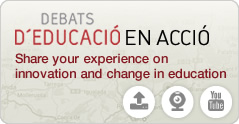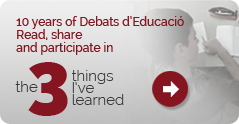- Català
- Español
- English
You are here
Building a school for the digital natives generation
About the speaker
Kirsti Lonka
Professor of Educational Psychology at the University of Helsinki
How do you create engaging learning environments? Recent attempts to reform Finnish schools
Summary of ideas
Some thoughts on education in Finland
- It is a system where the teachers, who are very well trained, are very independent and have the freedom to teach the way they think is appropriate.
- They work on cross-disciplinary projects and include various subjects such as sports, arts, cookery, handicrafts.
- There are no standardized exams until students are 18 years old.
- Compulsory education starts at the age of seven, and free play is worked on in pre-school.
- Students work quite a lot outside the classroom, despite the cold.
Warning signs
- A report was drafted in 2016 to adapt the curriculum to twenty-first-century skills. The conclusion was that although the Finnish education results are the best in the world, something was not being done well because the students display a high level of disaffection towards school:
- At the end of primary, students feel a lot of scepticism towards school. The boys, primarily, feel bored. The girls are less sceptical but feel "burned out"; they get better results in science subjects but they do not want to study for a career in this field. The students lack emotional and cognitive involvement; they feel tired and alienated and they cannot see the point in studying.
What is going on?
- School has not adapted to the change entailed by the socio-digital revolution. It is designed by people who are part of the baby boomer generation and is not adapted to the new generations of digital natives, who do not know how a computer or a mobile phone work technically but who have integrated their use into their everyday life.
- The new generations are adapted to multitasking; they read on screen; they communicate in chats (for them, email is obsolete); they are very active on social media and in e-gaming; they rely on the mobile; and they are constantly online. For them, being in class means changing to "flight mode".
- The skills for the twenty-first century are different from those that have been taught until now: we need to train active and creative citizens who work as a group and solve complex problems. They have to learn to learn, they have to attain communicative skills, different literacies and ICT skills applied to learning. We also need to train in entrepreneurship.
- "We need an epistemic change", according to Kirsti Lonka.
- We need to integrate the socio-digital revolution into school; use the devices that everyone has (mobiles, tablets) in learning. We carry around an encyclopaedia in our pocket. For example: we put forward a subject, we suggest looking for the answer on Google and debating which answer is the most suitable together. The classroom has to be managed differently.
- We have to foster flexible and attractive environments that promote collaborative work, that integrate the use of technology and that are more fun.
- Teachers must learn to say, "I don't know". A confused teacher is refreshing. We have to foster trans-generational learning.
Conclusions
- Disaffection with school is a global problem.
- There is a growing difference between school and the outside world.
- The good PISA results do not mean that changes do not need to be introduced.
- The main problem is adapting teacher training to the new reality. We should not be teaching technology, as this changes very quickly, but how to adapt to technology.
- It cannot be said that the fault of not introducing changes is the lack of money. We need to be imaginative in applying the resources we have.
With the collaboration:
Discover
other ideas
-

How to ensure that technological innovation improv...
Steven Hodas
2017 -

Cities as connected learning networks - The Pittsb...
Sunanna Chand
2017 -

The spiral of inquiry: a tool for educational tran...
Judy Halbert and Linda Kaser
2017







 The texts published on this website are, unless otherwise indicated, covered by the Creative Commons Spain Attribution - Non Commercial - No Derivs 3.0 licence. You may copy, distribute and transmit the work, provided you attribute it (authorship, journal name, publisher) in the manner specified by the author(s) or licensor(s). You may not use the material for commercial purposes. You may not transmit any derivative work from this material. The full text of the licence can be consulted here:
The texts published on this website are, unless otherwise indicated, covered by the Creative Commons Spain Attribution - Non Commercial - No Derivs 3.0 licence. You may copy, distribute and transmit the work, provided you attribute it (authorship, journal name, publisher) in the manner specified by the author(s) or licensor(s). You may not use the material for commercial purposes. You may not transmit any derivative work from this material. The full text of the licence can be consulted here: